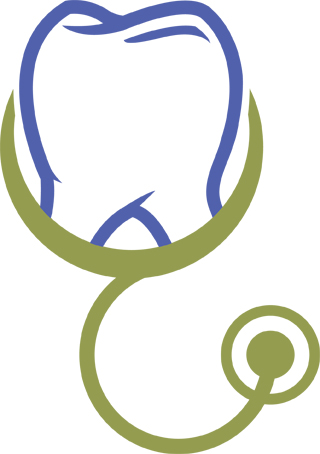
Studies Reveal Physical Health and Oral Health are Closely Related
More than 120 medical conditions, some of them life-threatening, can be detected in the early stages by a dentist. It is well documented that a high percentage of health conditions can have oral symptoms, such as swollen or bleeding gums, ulcers, dry mouth, bad breath, metallic taste and various other changes in the oral cavity.
Heart Disease
Studies have shown that people with moderate or advanced gum disease are more likely to have cardiovascular disease or heart disease than those with healthy gums. Heart disease often affects males and people of low income status as well as those who smoke, have a poor diet or have diabetes. Research has not shown that treatment for one of these diseases will help control the other, but we do know that regular dental checkups, professional cleanings and good oral hygiene practices can improve oral health and that good oral health contributes to good overall health.
Recently, new research published by the American Heart Association has demonstrated that using an oral topical remedy to reduce inflammation associated with gum disease (periodontitis) also results int he prevention of vascular inflammation and can lower the risk of heart attack. This discovery further shows increasing evidence of how problems in the mouth, and how they are treated, can have life-changing influences on other parts of the body. (1)
Diabetes
Studies show that people with diabetes are more susceptible to the development of gum disease or other oral health problems than those without diabetes. In addition, research shows that people with diabetes also have more tooth loss. Why? Diabetes can slow the healing process and lower resistance to infections, including oral infections.
Cancer
Your dentist should screen for oral cancer and other cancers of the head and neck, including skin cancer, cancer of the jaw bone and thyroid cancer, during routine checkups. They feel for lumps or irregular tissue changes in your neck, head, cheeks and oral cavity, and thoroughly examines the soft tissues in your mouth, specifically looking for any sores or discolored tissues. Survival rates greatly increase the earlier oral cancer is discovered and treated. You should see your dentist immediately if you observe:
- Any sore that persists longer than two weeks
- A swelling, growth or lump anywhere in or around the mouth or neck
- White or red patches in the mouth or on the lips
- Repeated bleeding from the mouth or throat
- Difficulty swallowing or persistent hoarseness
Tobacco Use
While most people are aware of the impact tobacco use has on their overall health, some might not consider its effects on oral health.
- Increased risk of mouth pain, cavities and gum recession (which can lead to tooth loss)
- Reduced ability to fight infection, including in the mouth and gums
- Slower healing of gum tissue after oral surgery or from injury
- Increased risk of tooth loss
- Increased risk of needing root canal treatment
- Increased risk of gum disease
- Reduced effectiveness of gum disease treatments
- Children exposed to tobacco smoke may have delays in the formation of their permanent teeth
Pregnancy
During pregnancy, hormonal changes may increase the risk of gingivitis, or inflammation of the gums. Symptoms include tenderness, swelling and bleeding of the gums. Without proper care these problems may become more serious and can lead to gum disease. A new survey has found that 42.5 percent of expecting mothers in the United States aren’t visiting a dentist during their pregnancy. Visiting your dentist during pregnancy is a crucial step and can help identify key health issues. Improving oral health during pregnancy can prevent complications associated with dental diseases, may reduce preterm and low birth rate deliveries and has the potential to prevent early childhood cavities in infants. If you notice any changes in your mouth during pregnancy, see your dentist.
Aging
Tooth loss may be an early indicator of cognitive and physical decline in older adults. Recent studies show that the memory and walking speeds of those who have lost all of their teeth decline more rapidly than in those who still have some of their teeth, performing about 10 percent worse. It is believed that recognizing excessive tooth loss may help physicians identify adults at higher risk of mental and physical decline. (2)
Visiting a dentist regularly can help you maintain your oral health. A dentist’s exam may detect poor nutrition and hygiene, as well as provide clues to your overall well-being. It is important for you and your family to provide your dentist with complete medical and dental histories and to inform your dentist of any recent health developments, including the use of over-the-counter medications and diet supplements, even if they seem unrelated to oral health. Some health conditions may affect how dental care is provided. (3)
(1) CDA Journal, Vol 43, pg. 286
(2) http://www.ada.org/en/publications/ada-news/2015-archive/march/tooth-loss-may-indicate-cognitive-physical-decline-later-in-life
(3) https://www.deltadentalins.com/oral_health/connection-oral-health.pdf
Leave a reply →